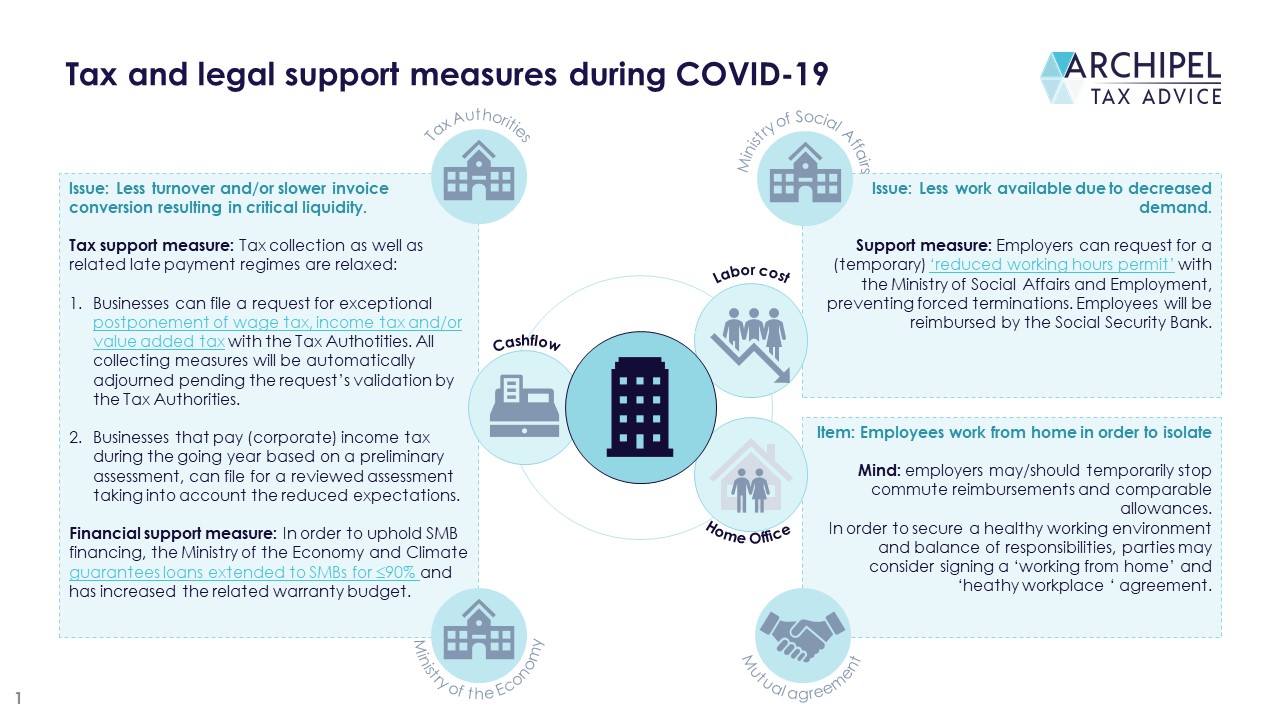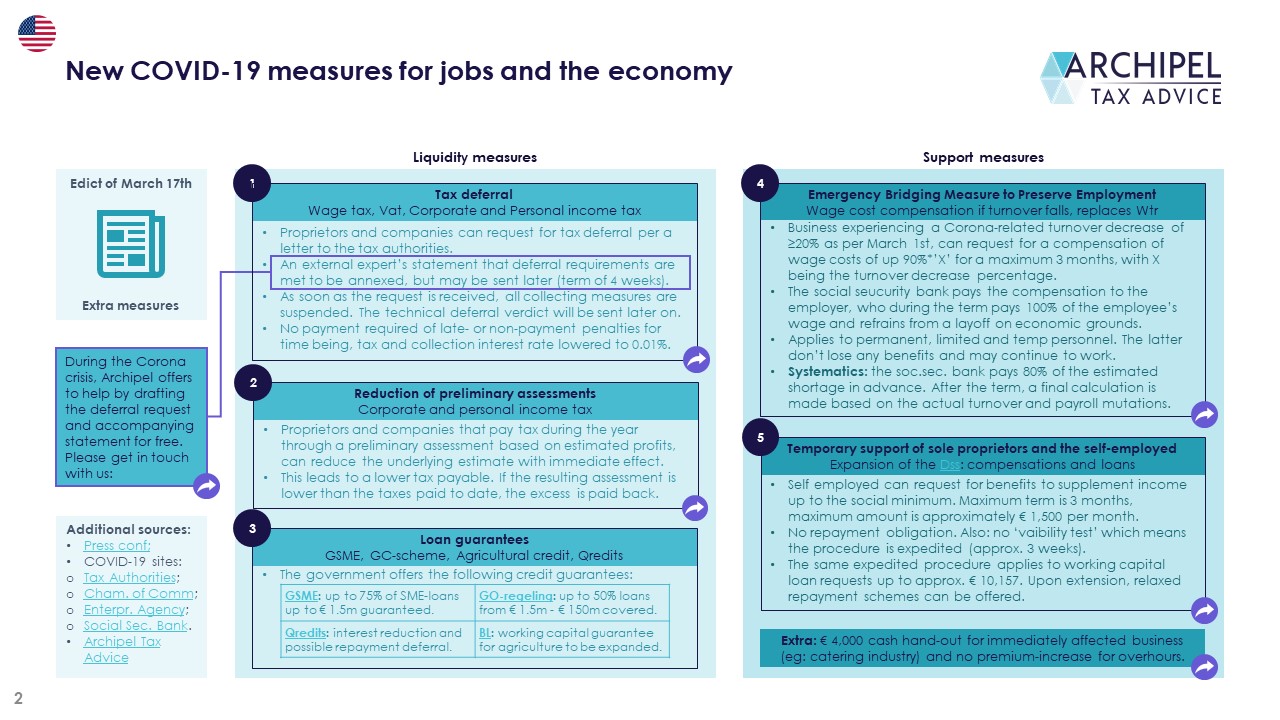[:nl]
*UPDATES*
Update 31 maart 2020
Vandaag is er een nieuwe kamerbrief gepubliceerd waarin de NOW (tijdelijke noodmaatregel overbrugging voor behoud van werkgelegenheid) is uitgewerkt. Dit is op dit moment nog geen wet, maar de brief geeft wel beter inzicht in hoe de maatregel eruit gaat zien. In afwachting van de regeling, hebben wij alvast een Excel gemaakt met een NOW-berekening, zodat je een gevoel kunt krijgen van hoe het zit bij jouw onderneming. Je kunt de Excel hier downloaden. En, heb je vragen of hulp nodig bij het aanvragen van de regeling? We helpen je graag. Neem gerust contact met ons op!
En hier lees je de volledige kamerbrief.
Update 20 maart 2020
In opvolging van de brieven van 12 en 17 maart, heeft het kabinet nu aangegeven de administratieve kant van uitstel van belasting zo makkelijk mogelijk te willen maken, daarom is de regeling verder versoepeld. Iedere ondernemer die door het coronavirus in de financiële problemen komt, komt ervoor in aanmerking. Een ondernemer kan het verzoek indienen via een brief, en zodra deze binnen is bij de Belastingdienst wordt alles direct stopgezet: je krijgt dus gelijk uitstel. Er is geen externe verklaring meer nodig. Dit geldt overigens wel alleen voor de eerste drie maanden. Bij een uitstel langer dan drie maanden is er wel aanvullende informatie nodig. Het kabinet onderzoekt nu welke informatie dit zou moeten zijn, en ook dit proces willen ze zo eenvoudig mogelijk houden.
De volledige brief vind je hier.
Update 18 maart 2020
Het kabinet heeft op 17 maart in een persconferentie nieuwe en meer uitgebreide maatregelen gepresenteerd om ondernemers te helpen. Een kort overzicht:
 En hier vind je ‘m in pdf, deze is klikbaar voor meer informatie.
En hier vind je ‘m in pdf, deze is klikbaar voor meer informatie.
Om de maatschappelijke effecten van het Coronavirus zo veel mogelijk te beperken, moeten wij allemaal samenwerken. De centrale oproep ‘to help flatten the curve‘ vraagt hierbij -zeer gefundeerd- om noemenswaardige inspanningen van werkend Nederland, en wordt gezien de uitzonderlijke omstandigheden sterk ondersteund vanuit overheid. Bijvoorbeeld met fiscale maatregelen.
Uiteraard is de volksgezondheid het meest urgente aandachtspunt, maar het onderliggende economische fundament vraagt ook om bescherming. Daarom publiceerden de ministers van Financiën, Economische Zaken en Klimaat, en Sociale Zaken en Werkgelegenheid op 12 maart 2020 een gezamenlijke Kamerbrief met economische maatregelen en mogelijkheden. Hieronder een kort overzicht in het Engels.
 Uitstel van belasting betalen voor ondernemers
Uitstel van belasting betalen voor ondernemers
Om ondernemers te helpen eventuele liquiditeitsproblemen te overbruggen, kunnen ondernemers een verzoek indienen voor het uitstellen van de betaling van de inkomstenbelasting, omzetbelasting, vennootschapsbelasting en loonbelasting. De Belastingdienst gaat akkoord met het uitstel als de ondernemer het voldoende schriftelijk heeft onderbouwd. De definitieve individuele beoordeling volgt later, maar zodra het verzoek binnen is bij de Belastingdienst wordt de invordering stopgezet.
De belastingdienst zet ook verzuimboetes voor het niet (op tijd) betalen van belastingen de komende tijd on hold: deze boetes worden niet uitgedeeld, of teruggedraaid.
Ondernemers die een lagere winst verwachten door het Coronavirus, kunnen tevens een verzoek indienen voor een verlaging van de voorlopige aanslag, waardoor er meteen minder belasting betaald hoeft te worden.
Uitgebreidere werktijdverkorting
Bedrijven die worden getroffen door het Coronavirus en die aan de voorwaarden voldoen, kunnen in aanmerking komen voor de huidige ‘regeling werktijdverkorting’. De werktijdverkorting is een al bestaande regeling voor bedrijven die door (nood)omstandigheden die buiten het normale ondernemersrisico vallen geen werk meer hebben voor (een deel van) hun personeel. De voorwaarden zijn dat er voor minstens 20% van het personeel geen werk is en dat deze situatie minimaal 2 en maximaal 24 weken duurt. Ook moet er een direct verband zijn met de uitbraak om een beroep te doen op de speciale verruiming. Voor het desbetreffende deel van het personeel kunnen werkgevers dan een beroep doen op de werkloosheidsuitkering (WW) waardoor het UWV het personeel compenseert. Het betreffende personeel dan wel WW-rechten hebben opgebouwd om hiervoor in aanmerking te komen.
Zzp’ers die door het virus in de problemen komen, kunnen een beroep doen op het BBZ (Besluit bijstandsverlening zelfstandigen 2004). Wel moeten zij aan de voorwaarden van deze regeling voldoen. Een beroep hierop doen kan via de gemeente.
Verruiming borgstelling MKB-kredieten (BMKB)
Bedrijven, maar voornamelijk het mkb, kunnen in liquiditeitsproblemen komen door het Coronavirus. Banken en andere financiers kunnen hierbij helpen, door bijvoorbeeld een tijdelijke verstrekking van een overbruggingskrediet, de ophoging van het Rekening Courantkrediet of een tijdelijk stop van het aflossen van eerder verleend krediet. Maar: dit vereist doorgaans wel dat het bedrijf zekerheid kan stellen. De overheid faciliteert hierin door onder de regeling Borsgtelling MKB-Kredieten (BMKB) garant te staan voor leningen in het MKB.
De staatssecretaris van Economische zaken en Klimaat (EZK) streeft ernaar dat er eind maart een tijdelijke verruiming van de BMKB zal zijn, waardoor ‘gezonde’ bedrijven gefinancierd blijven. De overheid staat in zo’n geval garant voor een deel van de borg voor bedrijven die een lening willen afsluiten, maar zelf niet genoeg zekerheid kunnen bieden. Er kan in ieder geval tijdelijk worden gerekend op gunstigere voorwaarden voor bedrijven die door het Coronavirus in de problemen komen. Zo komt er onder andere een nieuwe maatregel waardoor het maximale leningsdeel dat wordt gedekt door het borgstellingskrediet van 50% naar 75% wordt verhoogd.
Begrotingsbeleid en financiële markten
Ondernemers kunnen nu zeker de eerste gevolgen ondervinden van het Coronavirus, maar er zijn tot nu toe nog geen aanwijzingen dat de financiële sector in acute nood is. De afgelopen jaren zijn er maatregelen genomen om de financiële sector weerbaarder te maken voor dit soort situaties, zoals buffers om verliezen op te vangen en kredietverlening in stand te houden.
Een hart onder de riem van de ministers: de Nederlandse overheidsfinanciën staan er gelukkig goed voor. De begrotingssystematiek in Nederland gericht op het automatisch stabiliseren van de economie. Dit betekent dat alle maatregelen kunnen worden genomen, en er niet zomaar bezuinigd hoeft te worden bij een tegenslag.
Side note: thuiswerken
Niet opgenomen in de brief maar wel nuttig om in ogenschouw te houden: hangende COVID-19 wordt er breed thuisgewerkt om sociale onthouding te ondersteunen. Hierbij is het aan te bevelen voor werknemers en werkgevers om onderling de voorwaarden en verantwoordelijkheden af te stemmen, bijvoorbeeld in een thuiswerkovereenkomst. Denk hierbij aan het verzekeren van een ARBO-conforme arbeidsplek en bereikbaarheid.
Wij wensen iedereen een goede gezondheid en bestendige zaken.
Bas Jorissen en Eileen ten Boom.
[:en]
*UPDATES*
Update 31 March 2020
A new letter was published today in which the NOW (temporary emergency bridging measure to maintain employment) is elaborated. This is not yet a law, but the letter gives a better insight into what the measure will look like. In anticipation of the scheme, we have already made an Excel with a NOW calculation, so that you can get a feel of what it means for your company. You can download the Excel here (in Dutch). And, do you have any questions or need help applying for the scheme? We are happy to help you. Feel free to contact us!
And here you can read the full letter (also in Dutch).
Update 20 March 2020
Following the letters of 12 and 17 March, the Cabinet has now indicated that it wants to make the administrative side of tax deferral as easy as possible, which is why the scheme has been further eased. Any entrepreneur who gets into financial difficulties due to the coronavirus will be eligible for it. An entrepreneur can submit the request via a letter, and as soon as the request is received by the Tax Authority, everything will be stopped immediately: you will receive an immediate postponement. There is no longer any need for an external statement. However, this only applies to the first three months. If the postponement is longer than three months, additional information is required. The Cabinet is now investigating what information this should be, and they also want to keep this process as simple as possible.
The full letter can be found here (in Dutch).
Update 18 March 2020
In a press conference on 17 March, the cabinet presented new and more extensive measures to help entrepreneurs. A short overview:

And here it is in pdf, it is clickable for more information.
In order to minimalize the societal effects of the Corona virus, we must all work together. In that, the central appeal ‘to help flatten the curve‘ is a well-funded call upon the business world for significant efforts, which the government supports profoundly. Amongst others with tax measures.
It goes without saying that public health is the most urgent matter, but the underlying economic foundation asks for protection as well. Therefore, the minister of Finance, Economic Affairs and Climate, and Social Affairs and Employment published a joint letter to Parliament elaborating on economic measures and possibilities. A brief overview:
 Deferral of tax payments for entrepreneurs
Deferral of tax payments for entrepreneurs
In order to help entrepreneurs avoid potential liquidity problems, businesses can apply for postponed payment of income tax, sales tax, corporation tax and wage tax. The Belastingdienst agrees to the postponement if the entrepreneur, in writing, can substantiate why the exceptional postponement is justified, a final individual verdict of which will be received later on. However, as soon as the request has been received by the Belastingdienst, tax collection and measures will per default be halted pending COVID-19.
The Belastingdienst also puts default fines for not paying taxes (on time) on hold in the coming period: these fines will not be distributed, or reversed.
Entrepreneurs expecting lower profits due to the corona virus, can also apply for a reduction of the provisional assessment, as a result of which less tax has to be paid immediately.
More extensive ‘reduction of working hours’-permits
Companies that are affected by the Corona virus and that meet the conditions, are eligible for the current working time reduction permit. The reduction in working hours is an existing scheme for companies that, due to (emergency) circumstances that fall outside the scope of regular entrepreneurial risk, no longer have work for (part of) their staff. Conditions are that there is insufficient work for at least 20% of the staff, and that this will foreseeably last a minimum of 2 but a maximum of 24 weeks. In order to apply for the special broadened scope, there must be a direct link with the outbreak. Employers can then claim unemployment benefit (werkloosheiduitkering, WW) for the relevant part of the personnel, who will be reimbursedby the Social Security Bank. The personnel must have built up WW rights to be eligible for this.
If a self-employed person gets into financial trouble as a result of the virus, he or she can appeal to the BBZ (Besluit bijstandsverlening zelfstandigen 2004), if they meet the conditions for this scheme. This can be done via the local authority.
Widening the guarantee for SME loans
Companies, but especially SMBs, may face liquidity problems due to the Corona virus. Banks and other financiers can help with this, for example by temporarily providing a bridging loan, increasing the Current Account or temporarily stopping repaying previously granted credit. However, this usually requires the companies to be able to offer guarantees. In order to ascertain continued and/or exceptional financing, the government offers such guarantees under the SME-Guarantees scheme.
The State Secretary for Economic Affairs and Climate Change (Economische zaken en Klimaat, EZK) aims for a temporary expansion of the BMKB by the end of March, so that healthy companies will continue to be financed. In such a case, the government will partially guarantee companies that want to take out a loan, but are unable to offer enough security themselves. Better conditions can at least temporarily be expected for companies that get into trouble because of the Corona virus. For example, there will be a new measure increasing the maximum guarantee to cover 75% of the business loan rather than a maximum of 50%.
Budgetary policy and financial markets
Entrepreneurs may be the first to be financially affected by the Corona virus, but -so far- there are no indications that the financial sector is in immediate distress. In recent years, measures have been taken to make the financial sector more resilient to such situations, such as buffers to absorb losses and maintain lending.
Fortunately, the Dutch public finances are also in good shape. The budgetary system in the Netherlands is aimed at automatically stabilizing the economy. This means that all measures can be taken, and savings do not have to be made in the event of a setback.
Side note: working from home
Not mentioned in the letter but worth minding is that in efforts to instate a period of social isolation, many employees may work from home. It is advisable for the involved parties to sign a Working from Home-agreement in which the requirements and responsibilities, for instance in relation to setting up a healthy workplace, are mutually insured.
We wish everyone good health and secure business.
Bas Jorissen en Eileen ten Boom.[:]






